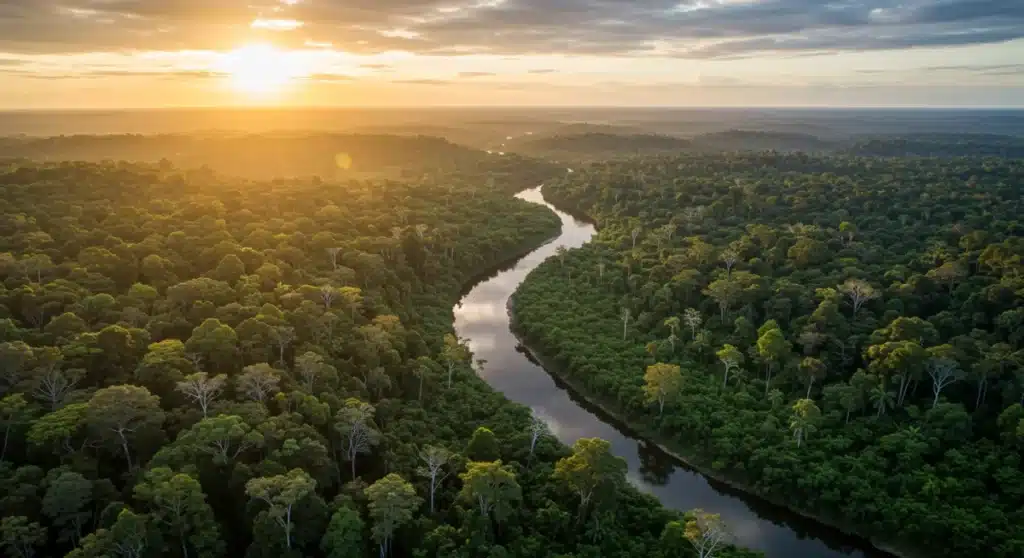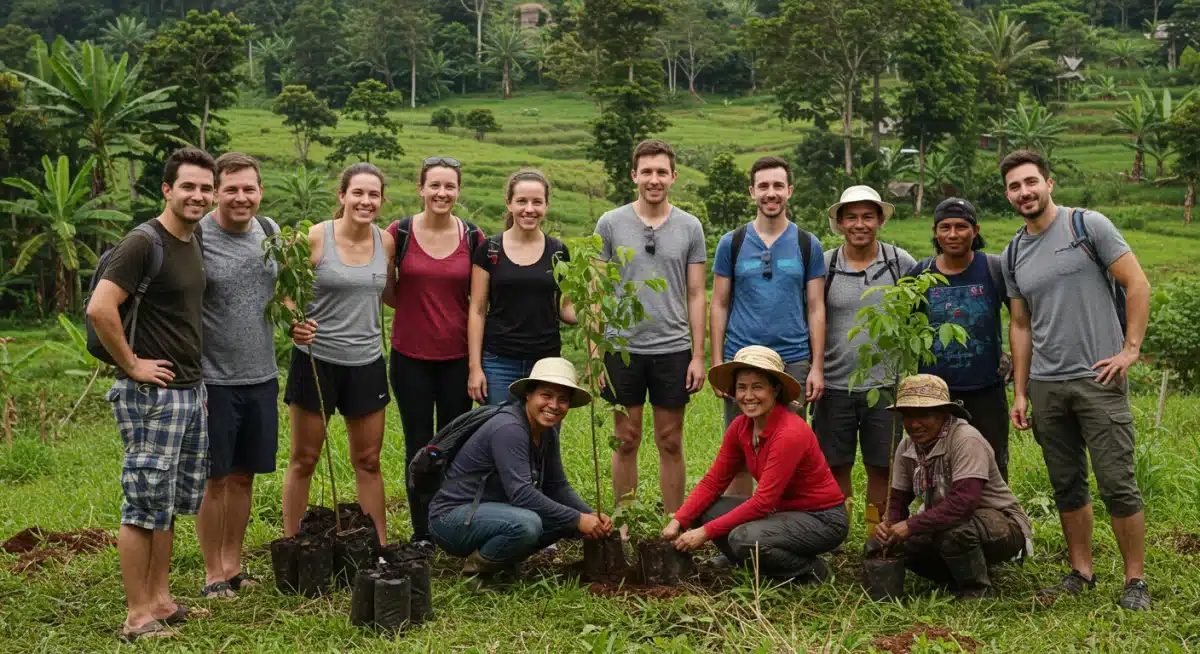Insider Knowledge: New World Expeditions & Sustainable Tourism

New World Expeditions is actively pioneering sustainable tourism by implementing innovative strategies that prioritize environmental protection, support local communities, and promote responsible travel, setting new industry benchmarks for eco-conscious exploration.
As the global tourism industry rapidly evolves, a new paradigm is emerging, championed by entities dedicated to preserving our planet while offering unparalleled travel experiences. Insider Knowledge: How New World Expeditions Are Pioneering Sustainable Tourism reveals the cutting-edge practices and philosophies driving this crucial shift. This report delves into how these expeditions are setting new standards for responsible exploration, balancing adventure with ecological and social stewardship.
The Foundation of Sustainable Practices
New World Expeditions has established a robust framework for sustainable tourism, moving beyond mere eco-friendly gestures to integrate comprehensive environmental and social responsibility into every facet of their operations. This commitment is evident in their meticulous planning and execution of expeditions.
Their approach begins with site selection, prioritizing destinations where tourism can genuinely benefit local ecosystems and communities without causing undue strain. This involves extensive research and collaboration with indigenous groups and conservation organizations, ensuring that every journey contributes positively rather than detracting from the natural and cultural heritage.
Minimizing Environmental Footprint
A core tenet of New World Expeditions’ strategy is the aggressive reduction of their environmental impact. This includes everything from waste management protocols to energy consumption on their vessels and at their base camps.
- Waste Management: Implementation of stringent ‘leave no trace’ policies, including waste segregation, recycling, and composting programs at all expedition sites and on transport.
- Energy Efficiency: Utilizing renewable energy sources such as solar panels for power generation and promoting fuel-efficient transportation methods whenever possible.
- Water Conservation: Employing water-saving technologies and educating travelers on responsible water usage in often water-scarce regions.
These measures are not just guidelines; they are strictly enforced and continuously monitored, with regular audits ensuring compliance and identifying areas for further improvement. The goal is to set a new benchmark for minimal environmental impact in the adventure tourism sector.
Engaging Local Communities for Mutual Benefit
Beyond environmental stewardship, New World Expeditions places significant emphasis on fostering strong, mutually beneficial relationships with local communities. This approach recognizes that true sustainability must encompass social and economic well-being for the people residing in the expedition areas.
The expeditions actively seek to employ local guides, staff, and service providers, providing fair wages and training opportunities. This not only enhances the authenticity of the travel experience but also injects vital economic support directly into the local economies, reducing reliance on unsustainable practices.
Cultural Exchange and Preservation
Respect for local cultures and traditions is paramount. New World Expeditions designs itineraries that encourage meaningful cultural exchange, allowing travelers to learn from and interact with indigenous peoples in a respectful and ethical manner.
- Ethical Sourcing: Prioritizing the purchase of local goods and services, including food, crafts, and accommodation, to support local businesses and artisans.
- Cultural Sensitivity Training: Providing comprehensive training for both staff and travelers on local customs, etiquette, and historical contexts to ensure respectful interactions.
- Community Projects: Investing a portion of their profits and organizing volunteer opportunities for travelers to participate in community development projects, such as school renovations or clean water initiatives.
These initiatives ensure that the cultural integrity of the regions visited is not only preserved but actively celebrated and strengthened through responsible tourism. The expeditions act as a bridge, connecting global travelers with local wisdom and traditions.
Innovative Conservation Initiatives
A distinctive feature of New World Expeditions is their direct involvement in groundbreaking conservation projects. They understand that passive observation is not enough; active participation in environmental protection is essential for long-term sustainability.
The company collaborates with leading scientists and conservationists to fund and implement research and restoration efforts in the regions they explore. This includes marine conservation in delicate coral reef ecosystems and reforestation projects in threatened terrestrial habitats.

Traveler Participation in Conservation
Travelers are often given unique opportunities to contribute directly to these conservation efforts, transforming their vacation into a meaningful conservation experience. This hands-on involvement fosters a deeper connection to the environment and educates participants on critical ecological issues.
For instance, some expeditions include sessions where travelers assist in identifying local flora and fauna, collect scientific data, or participate in beach clean-ups. This experiential learning is a powerful tool for raising awareness and inspiring future conservation advocates.
New World Expeditions has recently launched a new initiative focused on tracking migratory bird patterns in remote Amazonian regions. This program, in partnership with local universities, allows travelers to join ornithologists in the field, contributing directly to data collection that informs conservation strategies. This innovative approach merges adventure with vital scientific research, offering a truly unique and impactful travel experience.
The Role of Education and Awareness
Education is a cornerstone of New World Expeditions’ philosophy. They believe that informed travelers are more likely to become responsible global citizens and advocates for sustainable practices. Every expedition is designed to be an immersive learning experience.
Expert guides, often local specialists or scientists, provide in-depth knowledge about the local ecosystems, wildlife, and cultural heritage. This educational component goes beyond simple facts, delving into the complex interdependencies of natural systems and the challenges faced by local communities.
Pre-Trip and On-Trip Learning
The educational journey begins even before the expedition departs, with comprehensive pre-trip materials that prepare travelers for the unique environments and cultures they will encounter. This ensures that participants arrive with a foundational understanding and a mindset geared towards respectful engagement.
- Briefings and Workshops: Regular informational sessions on wildlife, geology, cultural history, and conservation challenges are conducted throughout the trip.
- Interactive Learning: Opportunities for Q&A with experts, discussions, and hands-on activities that deepen understanding and engagement.
- Post-Trip Resources: Providing resources for travelers to continue their learning and advocacy efforts after returning home, fostering a lasting commitment to sustainability.
By empowering travelers with knowledge, New World Expeditions aims to create a ripple effect, inspiring individuals to adopt more sustainable lifestyles and advocate for environmental protection in their own communities.
Measuring Impact and Continuous Improvement
New World Expeditions is committed to transparency and accountability. They understand that true sustainability requires continuous evaluation and adaptation. Therefore, they have implemented rigorous systems to measure their environmental and social impact.
This includes tracking key performance indicators (KPIs) such as carbon emissions, waste diversion rates, local employment figures, and community project outcomes. Regular reports are generated and, in some cases, made publicly available, demonstrating their commitment to open communication.
Adaptation and Innovation
The data collected from impact assessments informs ongoing improvements and innovations. New World Expeditions constantly seeks new technologies and best practices to further enhance their sustainable operations and reduce their footprint.
For example, recent data indicated areas where water consumption could be further reduced, leading to the trial of new greywater recycling systems at remote camps. This proactive approach ensures that they remain at the forefront of sustainable tourism development.
Furthermore, feedback from both travelers and local partners is actively solicited and incorporated into future expedition planning. This iterative process allows the company to refine its offerings and ensure they remain aligned with both conservation goals and community needs. This dedication to improvement underscores their pioneering spirit in the realm of sustainable travel.
Challenges and Future Outlook
While New World Expeditions has made significant strides in pioneering sustainable tourism, the path forward is not without its challenges. Operating in remote and often fragile environments presents logistical complexities and requires constant vigilance against unforeseen impacts.
One of the primary challenges lies in scaling their sustainable model without compromising its integrity. As demand for responsible travel grows, maintaining the high standards of environmental protection and community engagement becomes increasingly complex. Additionally, navigating diverse regulatory landscapes in different countries requires adaptable and informed strategies.
Expanding Horizons Responsibly
Looking ahead, New World Expeditions plans to expand its reach, bringing its sustainable model to new destinations. This expansion will be guided by the same principles of thorough impact assessment, community consultation, and conservation partnership that have defined their success thus far. They are currently exploring new routes in lesser-known archipelagos, aiming to introduce sustainable practices to areas previously untouched by responsible tourism initiatives.
The company is also investing in advanced research and development for sustainable travel technologies, including alternative fuels for their vessels and lighter, more environmentally friendly expedition gear. Their commitment to innovation suggests a future where adventure tourism not only minimizes harm but actively contributes to global conservation and local empowerment, setting a powerful example for the entire industry to follow.
| Key Aspect | Brief Description |
|---|---|
| Environmental Stewardship | Minimizing ecological footprint through waste reduction, energy efficiency, and water conservation. |
| Community Engagement | Supporting local economies and cultures through employment, ethical sourcing, and community projects. |
| Conservation Initiatives | Direct involvement in scientific research and ecological restoration, often with traveler participation. |
| Education & Awareness | Empowering travelers with knowledge to become advocates for sustainable practices and global conservation. |
Frequently Asked Questions About Sustainable Tourism
Sustainable tourism for New World Expeditions involves minimizing environmental impact, supporting local economies and cultures, and contributing to conservation. It’s about responsible travel that preserves destinations for future generations while providing meaningful experiences today. This holistic approach guides all their operations.
They foster benefits by employing local guides and staff, ethically sourcing goods and services from local businesses, and investing in community development projects. This direct economic engagement ensures tourism revenue stays within the host regions, empowering residents.
Yes, many expeditions offer unique opportunities for travelers to engage directly in conservation. This can include assisting in scientific data collection, participating in reforestation, or contributing to wildlife monitoring, making their journey impactful and educational.
New World Expeditions implements strict ‘leave no trace’ principles, including advanced waste management, reliance on renewable energy, and water conservation technologies. They continuously monitor and adapt practices to ensure the lowest possible ecological footprint.
The outlook involves expanding their sustainable model to new destinations while maintaining integrity, investing in eco-friendly technologies, and deepening partnerships. They aim to continue innovating and setting benchmarks for responsible adventure travel globally.
What Happens Next
As New World Expeditions continues to refine and expand its sustainable tourism model, the industry will be closely watching. The current trajectory suggests a push towards even greater technological integration for environmental monitoring and further diversification of community engagement projects. Expect future announcements regarding new partnerships with scientific institutions and local governments aimed at creating protected areas and fostering economic resilience. This pioneering work is not just about isolated expeditions; it’s about shaping the future of global travel to be inherently more responsible and regenerative.